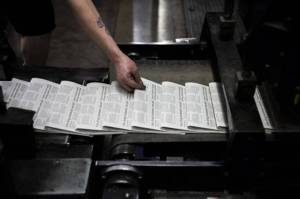Welch: Why is our foot on the gas when the wheel is broken?
Published 1:30 am Wednesday, October 29, 2025
By Todd Welch / Herald Columnist
Washington’s government isn’t just limping; it’s running full speed on a broken wheel.
The gears grind, the spokes snap, and yet the same people keep pushing it forward as if momentum alone will fix what’s fundamentally wrong. Our state system has become a continuous cycle of destruction, cronyism, inefficiency and failure funded by the very taxpayers it’s supposed to serve.
The political machine: Let’s start with the cycle itself. Public-sector unions, including the Washington Education Association and the Service Employees International Union, collect dues from their members and then funnel millions into Democratic Party campaign coffers. Those dollars don’t come from spontaneous generosity; they’re strategic investments. The unions hire professional activists, paid operatives whose full-time job is to campaign, protest and shut down dissent. Once their chosen candidates win office, the payback begins.
In city halls, county councils and Olympia, those same elected officials return the favor with massive pay raises, generous new contracts, and policies that haven’t been studied or debated, but rather demanded by the same activist networks that put them there. It’s not policymaking, it’s patronage. And every turn of that wheel is greased with taxpayer money.
The results we keep ignoring: We’re told these investments in “progress” will improve services, build a better future, and create equity. But look around. Are things working better?
Sound Transit is perhaps the most glaring example. Voters approved a staggering $50 billion plan — ST3 — to extend light rail to Everett and elsewhere. Now, the agency is already $20 billion to $30 billion over budget and years behind schedule. Those are not rounding errors; they’re systemic failures.
Snohomish County has raised taxes, but somehow remains millions over budget. The state Legislature, dominated by Democrats and recently signed off by Gov. Bob Ferguson, has enacted the largest tax increases in Washington’s history. And yet, before much of that revenue is even collected, Ferguson is already warning that the state will face a $12 billion to $16 billion shortfall in the coming biennium.
The question itself: Is the problem really a lack of money, or is the system itself broken?
When accountability disappears: In the private sector, a company that repeatedly overspends, under delivers and mismanages would collapse. In government, it gets a budget increase. Accountability, the cornerstone of democracy, has eroded into ritualized blame-shifting. When projects fail, bureaucrats claim “unexpected costs.” When revenues fall short, politicians blame “unforeseen circumstances.” When taxpayers complain, they’re accused of being anti-worker or anti-education.
The truth is simpler and more painful: Our systems no longer reward competence or efficiency. They reward political loyalty and public messaging. The people who can fix things are pushed aside by those who can fundraise and tweet.
The activist economy: Washington has developed a professional political class, a revolving door of consultants, activists and union representatives who move seamlessly between campaigns, government jobs and lobbying gigs. Their livelihoods depend not on solving problems but on perpetuating them.
The more crises they manufacture, the more funding they demand. The more outrage they stoke, the more voters are distracted from the results. And every two or four years, they rely on one simple reflex: Vote for the “D” next to the name. Never mind the record; the narrative is what counts.
The taxpayer as afterthought: At the center of this cycle stands the taxpayer, the one constant in the system. Every inefficiency, every overrun, every sweetheart deal is ultimately billed to you. You’re told that the next tax, the next levy, the next expansion will finally “fix the system.” But the system doesn’t want to be fixed. It works precisely as designed: to extract money from the public and distribute it among the insiders who keep the machine running.
And so the wheel turns again. The unions fund the campaigns. The activists organize the pressure. The politicians deliver the favors. The media, often sympathetic or incurious, covers the symptoms but rarely the structure. And the taxpayer, busy living a real life outside the Olympia bubble, foots the bill.
Breaking the cycle: Fixing this won’t be easy, and it won’t come from inside the system. Real reform will require voters to look beyond party labels and start judging by results, not rhetoric. It will require public employees who are willing to speak out, journalists willing to investigate, and citizens willing to vote differently; not just for a different candidate, but for a different culture of governance.
It starts by refusing to accept the lie that higher taxes equal better outcomes. It starts by demanding transparency and performance audits for every agency that asks for more money. It starts by asking a question that too few in power want to hear:
If the government keeps failing at its mission, why do we keep rewarding it?
The wheel doesn’t have to keep spinning. But first, we have to admit: It’s broken.
Todd Welch is a columnist for The Herald, addressing local and state issues. He lives in Everett.


